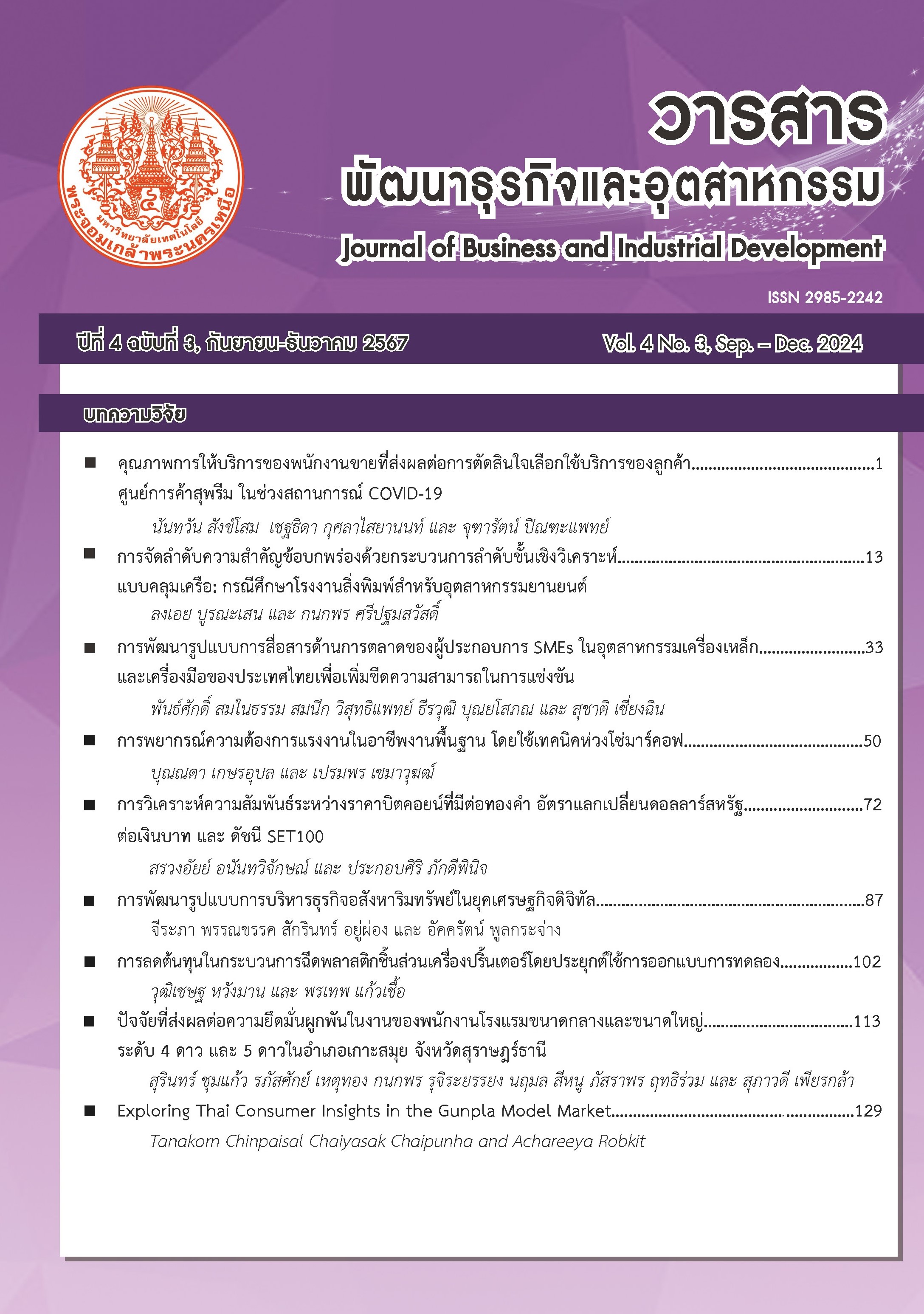Factors Affecting Work Engagement of Employees of Medium and Large 4-Star and 5-Star Hotels in Koh Samui District, Surat Thani Province
Keywords:
Hotel business, Organization-based self-esteem, Supervisor-based self-esteem, Occupational self-efficacy, Work engagementAbstract
This research aimed to 1) explore the relationships between organization-based self-esteem, supervisor-based self-esteem, and occupational self-efficacy with work engagement, and 2) assess the joint predictive power of these three variables on work engagement. This study’s samples included 186 Thai entry-level employees from six medium- and large-sized hotels (4- and 5-star) in Koh Samui, Surat Thani Province. Data were collected through a questionnaire, and statistical analyses included percentages, means, standard deviations, Pearson correlation coefficients, and stepwise multiple regression analysis. The findings revealed that organization-based self-esteem, supervisor-based self-esteem, and occupational self-efficacy were positively and significantly correlated with employees' work engagement at the .01 level (r = .494, r = .429, and r = .531, respectively). Additionally, occupational self-efficacy and organization-based self-esteem jointly predicted approximately 36.0% of the variance in work engagement, with significance at the .001 level. However, supervisor-based self-esteem did not significantly predict work engagement.
References
Pholphirul, P. (2013). Roles of Thai Small and Medium Enterprises Under Creative Economy. NIDA Economic Review, 7(1), 205–250. (in Thai)
Dechawatanapaisal, D. (2022). Organizational Behavior: Theory and Application. Bangkok: Chulalongkorn University Press. (in Thai)
Bakker, A. B., & Demerouti, E. (2008). Towards a Model of Work Engagement. Career Development International, 13(3), 209–223.
Chen, G., Goddard, T. G., & Casper, W. J. (2004). Examination of the Relationships Among General and Work‐Specific Self‐Evaluations, Work‐Related Control Beliefs, and Job Attitudes. Applied Psychology, 53(3), 349–370.
Schaufeli, W. B., Salanova, M., González-Romá, V., & Bakker, A. B. (2002). The Measurement of Engagement and Burnout: A Two Sample Confirmatory Factor Analytic Approach. Journal of Happiness Studies, 3, 71–92.
Smithikrai, C., & Pusapanich, P. (2017). Factors Influencing Work Engagement and Organizational Commitment of Chiang Mai University Staff. Kasetsart Journal of Social Sciences, 38(2), 655–667.
Kim, M., & Beehr, T. A. (2018). Challenge and Hindrance Demands Lead to Employees' Health and Behaviors Through Intrinsic Motivation. Stress and Health, 34(3), 367–378.
Pierce, J. L., Gardner, D. G., Cummings, L. L., & Dunham, R. B. (1989). Organization-Based Self-Esteem: Construct Definition, Measurement, and Validation. Academy of Management Journal, 32, 622–648.
Landry, G., & Vandenberghe, C. (2009). Role of Commitment to the Supervisor, Leader-Member Exchange, and Supervisor-Based Self-Esteem in Employee-Supervisor Conflicts. The Journal of Social Psychology, 149(1), 5–28.
Rigotti, T., Schyns, B., & Mohr, G. (2008). A Short Version of the Occupational Self-Efficacy Scale: Structural and Construct Validity Across Five Countries. Journal of Career Assessment, 16(2), 238–255.
Sorod, B. (2012). Research Methodology in Human Resource and Organization Development. Bangkok: M N Compute Offset. (in Thai)
Burn, N., & Grove, S. K. (2005). The Practice of Nursing Research: Conduct, Critique & Utilization (5th ed.). Philadelphia: W. B. Saunders.
Sangchoey, T., Jindachote, P., & Mongkolnimit, S. (2021). Generation Y: Affective Organizational Commitment and Intention to Stay. Silpakorn University e-Journal, 41(3), 50–62. (in Thai)
Schaufeli, W. B., Bakker, A. B., & Salanova, M. (2006). The Measurement of Work Engagement with a Short Questionnaire: A Cross-National Study. Educational and Psychological Measurement, 66(4), 701–716.
Silpcharu, T. (2020). Research and Statistical Analysis with SPSS and AMOS. Bangkok: Business R&D. (in Thai)
Nunnally, J. C. (1978). Psychometric Theory (2nd ed.). New York: McGraw Hill.
Hair, J. F., Jr., Black, W. C., Babin, B. J., & Anderson, R. F. (2010). Multivariate Data Analysis: A Global Perspective (7th ed.). New Jersey: Pearson Prentice Hall.
Costantini, A., Ceschi, A., Viragos, A., De Paola, F., & Sartori, R. (2019). The Role of a New Strength-Based Intervention on Organization-Based Self-Esteem and Work Engagement: A Three-Wave Intervention Study. Journal of Workplace Learning, 31(3), 194–206.
Filosa, L., & Alessandri, G. (2024). Longitudinal Correlated Changes of Global and Organization‐Based Self‐Esteem at Work. Applied Psychology, 73(1), 381–405.
Gordon, J. R., & Hood, E. (2021). Organization-Based Self-Esteem and Work-Life Outcomes. Personnel Review, 50(1), 21–46.
PM, N., Jose, G., Vincent, M. T. P., & John, A. (2023). Workplace Bullying, Engagement and Employability: Moderating Role of Organization-Based Self-Esteem. Employee Responsibilities and Rights Journal, 35(3), 417–432.
Korman, A. K. (1970). Toward an Hypothesis of Work Behavior. Journal of Applied Psychology, 54(1), 31.
Korman, A. K. (1976). Hypothesis of Work Behavior Revisited and an Extension. Academy of Management Review, 1(1), 50–63.
Clauss, E., Hoppe, A., Schachler, V., & O’Shea, D. (2021). Occupational Self-Efficacy and Work Engagement as Moderators in the Stressor-Detachment Model. Work & Stress, 35(1), 74–92.
Guarnaccia, C., Scrima, F., Civilleri, A., & Salerno, L. (2018). The Role of Occupational Self-Efficacy in Mediating the Effect of Job Insecurity on Work Engagement, Satisfaction and General Health. Current Psychology, 37, 488–497.
Downloads
Published
How to Cite
Issue
Section
License
Copyright (c) 2024 Journal of Business and Industrial Development

This work is licensed under a Creative Commons Attribution-NonCommercial-NoDerivatives 4.0 International License.





